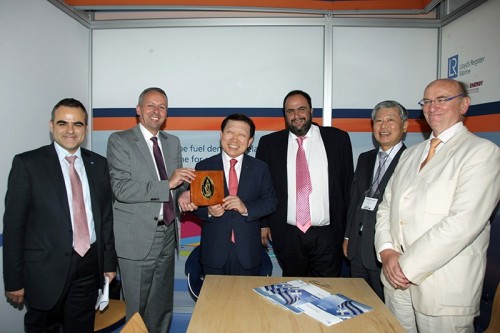
Capital Ship Management Corp. is Successfully Assessed by Lloyd’s Register of Shipping Against the “IMO Strategic Concept of a Sustainable Shipping Industry”

Athens, Greece, June 4, 2014. Capital Ship Management Corporation (‘Capital’) is prioritising a business strategy inspired by, and applying, the key principles and goals of the International Maritime Organisation’s (IMO’s) Strategy for Sustainable Maritime Transport Systems. Capital is incorporating key 'imperatives' and 'goals', as defined by IMO in the company’s management systems across its operations.
Capital has established a task force to implement specific actions, plans, processes, and to develop systems addressing sustainability. Priority has been given to the promotion of a safety culture and environmental stewardship, as well as to the education, training and support of seafarers. Additionally, the strategy will encompass a drive to reduce the energy required to operate and explore and evaluate the potential of alternative marine fuels – particularly LNG.
At a project launching ceremony held during Posidonia 2014, Evangelos Marinakis, Chairman of the Board of Capital Product Partners LP, commented: "We need to understand and derive the maximum benefit from new technologies and the innovations that can drive total corporate performance – making our ships more efficient and attractive in the market place, offering our seafarers safe and rewarding careers, all while working to reduce the environmental impact of the ships we manage."
Lloyd’s Register (LR) is providing independent verification of Capital’s sustainability performance to ensure effective measurement of progress and client awareness of key performance indicators as well as supporting the LNG as fuel joint development project. "Capital’s strategy is a platform for innovation," says Apostolos Poulovassilis, Regional Marine Manager EMEA for Lloyd’s Register. "And we provide independent insight, risk analysis, experience and the verification to support operational and investment decisions - as new systems, processes and technologies are considered and adopted. Capital is addressing the issues that are raised by the research and development that we have carried out to date such as our Global Marine Fuel Trends 2030 report issued in March." (www.lr.org/gmft2030)
The Joint Development Project between Capital, LR and Daewoo Shipbuilding and Marine Engineering (DSME) is specifically examining LNG as fuel, its technology specification and costs including fuel performance, as well as the potential safety implications of its use on a future ultra large container ship design which will be developed with input from all three stakeholders.
Mr Marinakis concluded: "Capital Ship Management strongly believes that the benefits of lower SOx, NOx and, potentially, reduced greenhouse gas emissions makes LNG as a marine fuel an attractive option. We think that competitive LNG pricing and an adequate global LNG bunkering infrastructure could be a reality within five to ten years. We want to be ready and we welcome the broad support that our partners LR and DSME can provide in helping us develop more sustainable shipping solutions."
Note to editors
About the International Maritime Organisation’s (IMO’s) Strategy for Sustainable Maritime Transport Systems












